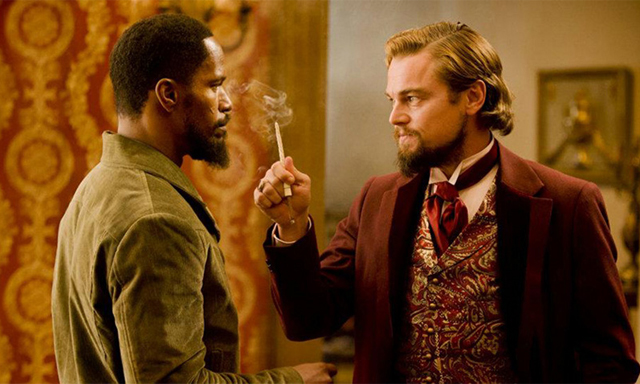Film: Django Unchained
Country: USA
Year of Release: 2012
Director: Quentin Tarantino
Screenwriter: Quentin Tarantino
Starring: Jamie Foxx, Christoph Waltz, Leonardo DiCaprio, Samuel L Jacson, Kerry Washington
Review: Peter Machen
♥♥♥
There’s a moment in Django Unchained, the latest movie from Quentin Tarantino, when Dr King Schultz, one of the film’s two central protagonists, utters the words “I just can’t resist it”, before launching himself headfirst into the kind of graphically explicit over-the-top bloodbath that we’ve come to expect from Tarantino over the course of the last two decades. But those words, while fitting comfortably into the film’s narrative, may as well be coming straight from the mouth of Tarantino himself. He simply can’t resist the opportunity of taking a film that would in many ways benefit from being played fairly straight, and twisting and accelerating it into a production that is defiantly the work of a schlock master.
Django Unchained is, in essence, a movie about racism, and more specifically about the context of racism as located in the twin projects of imperialism and colonialism in 19th century America. Set in the American South during the period immediately preceding the Civil War, Django (played gamely and with remarkable range by Jamie Foxx) is a slave who is granted a freedom of sorts when he is, in a manner of speaking, bought from a couple of slave traders by the aforementioned Schultz (Christoph Waltz).
Schultz is a bounty hunter who has been seeking out Django, whose brutal experiences at the hands of the murderous Brittle brothers, will, he hopes, help him track down the men, for whom a large bounty has been offered (they are wanted, not because of their abysmal treatment of their slaves, but rather because of the lives and wealth they have taken as stage-coach robbers). And so Schultz sets up Django as his personal valet and, his technical ownership of him notwithstanding, as something resembling a free man, although Django will only earn that freedom when the two of them have tracked down – and killed – the Brittle Brothers.
While Django is happy to help bring about the demise of his brutal former masters, his chief concern is finding and freeing Broomhilda (Kerry Washington), the German-speaking wife he long ago lost to the slave trade. His and Schultz’s dual quests takes them to an infamous plantation named Candyland, where the brothers are hiding out and Broomhilda lives a humiliating existence. The plantation is owned by the psychopathically racist Calvin Candie (played with a dash too much relish by Leonardo DiCaprio) and inhabited by a number of slaves who have incorporated the master-slave relationship into their interior psychologies. Chief among them is Stephen (a virtually unrecognisable Samuel L Jackson), who, like nearly everybody in the movie, is appalled at seeing Django – a black man – riding his own horse. He is also unconvinced about the relationship between Django and Schultz.
While Dr Schultz is a man who trades corpses for riches, he is also, all things being relative, a remarkably moral man who finds the contempt of white men for their black brothers more reprehensible than the violence which results from that contempt. It is Schultz not Django who is the film’s moral centre. Django is just too plain cool for such a role, and besides, Tarantino’s film, like the political landscape of the film’s American South, remains a world in which white men are both oppressors and saviours.
Yet it’s difficult to tell to what extent the film is actually about race in contemporary American and global society. Tarantino has bloodied the waters to much to really discern anything apart from the most obvious moral and political dimensions. And I can’t help feeling that by doing so, by intentionally weakening his own film and taking it with such emphasis into the realm of the unreal, he is committing an act of cinematic and political cowardice.
Tarantino is certainly capable of political and narrative coherence, and of making films which don’t rely upon litre after litre of fake blood. His earlier works, including his relatively low key masterpiece Jackie Brown, are proof enough of this. And in fact much of Django Unchained is also proof of Tarantino’s ability to control his films. But like the trigger-happy Schultz, Tarantino doesn’t want to play by the rules – he just can’t resist himself – and in the process of giving in to his baser instincts and bowing with great inconsistency to the freewheeling tomato sauce of the spaghetti western, he severely limits the power of what could have been a major work of cinema.

